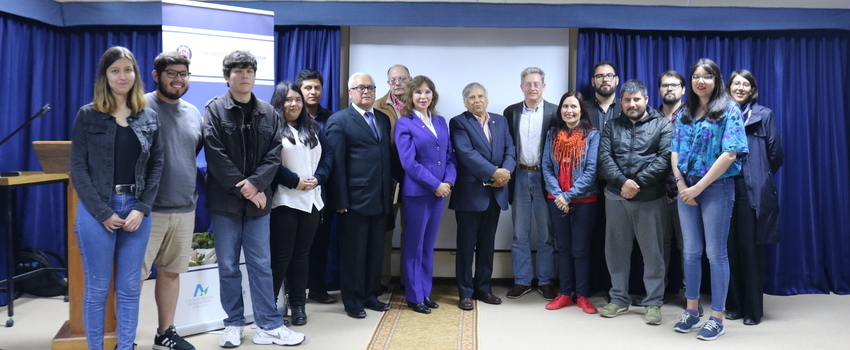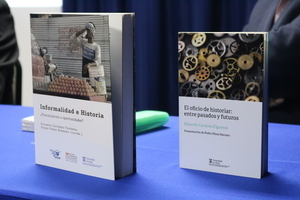- News
Pedagogy in History and Geography holds a discussion and launches books by prominent historians

Emphasizing the importance of the future is the main line pursued by both publications by prominent historians worldwide, who within the framework of the 50th anniversary of the Pedagogy degree in History and Geography at the University of La Serena held a launch discussion.
In the Andacollo Hall of the Central House of the University of La Serena, the discussion and launch of the publications of the academic from the University of Alcalá, Spain, Dr. Pedro Pérez Herrero, and the 2008 National History Prize winner and Emeritus Professor took place. from the Catholic University of Valparaíso, Dr. Eduardo Cavieres Figueroa.
 The discussion took place within the framework of the activities to celebrate the fiftieth anniversary of the Pedagogy in History and Geography degree, in which university authorities, academics and students were present, who participated in an enriching day in favor of reflection and deepening around these two new publications.
The discussion took place within the framework of the activities to celebrate the fiftieth anniversary of the Pedagogy in History and Geography degree, in which university authorities, academics and students were present, who participated in an enriching day in favor of reflection and deepening around these two new publications.
Both books were written collaboratively by both history professors, “Informality and History: Precariousness or opportunities?” and “The Historian's Office: between pasts and futures”, which invite readers and future historians to adopt a more purposeful vision of professional practice.
The academic from the University of Alcalá, Spain, Dr. Pedro Pérez Herrero, stressed that the current mission consists of building new narratives. “What students must learn is to build their own history, learn not to repeat, not to memorize, but to build, they must be free. The spirit of self-criticism is based on freedom, and freedom means commitment and responsibility,” he stated.
Likewise, the 2008 National History Prize winner, Dr. Eduardo Cavieres Figueroa, emphasized his special link with the Pedagogy degree in History and Geography at the University of La Serena and emphasized the vitalizing importance of history in favor of improvements for the common benefit. “Sensibleness is essential in our lives and in the development of history,” he noted.
The discussion allowed those present to participate in a thoughtful round of questions in which the search for answers to current regional, national and global events took precedence, in favor of the collective construction of a world compatible with the conceptions of the common good.
Written by Paula Godoy, ULS journalist
